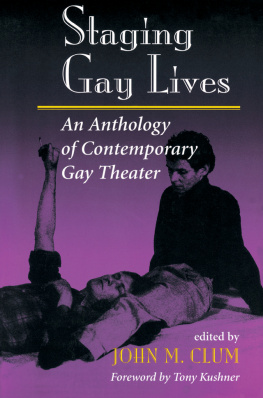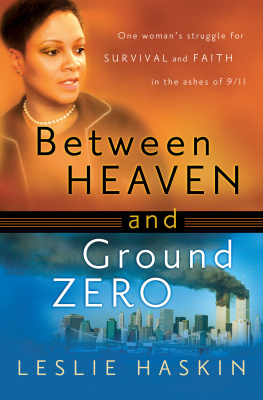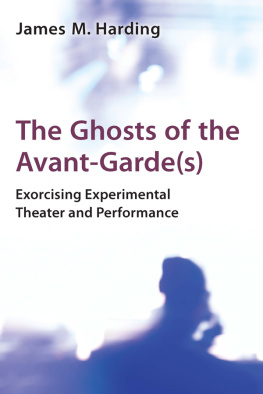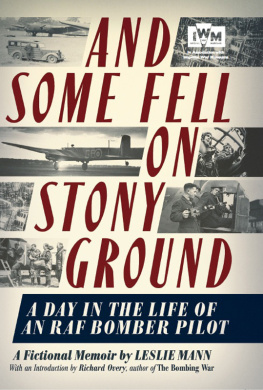LESLIE STAINTON
STAGING GROUND
AN AMERICAN THEATER
AND ITS GHOSTS
THE PENNSYLVANIA STATE UNIVERSITY PRESS
UNIVERSITY PARK, PENNSYLVANIA
A KEYSTONE BOOK
Keystone Books are intended to serve the citizens of Pennsylvania. They are accessible, well-researched explorations into the history, culture, society, and environment of the Keystone State as part of the Middle Atlantic region.
Portions of this book have been previously published in somewhat different form:
The Prologue incorporates material from Stage-Struck, in The Documentary Imagination (Part Two), ed. Tom Fricke and Keith Taylor, special issue, Michigan Quarterly Review 45, no. 1 (2006).
Chapter 3 incorporates material from Conestoga, in Due North, special issue, Crab Orchard Review 17, no. 2 (2012).
Chapter 15 incorporates material from Players, Common-place 8, no. 4 (2008). Courtesy of Common-place, http://common-place.org.
The excerpt from Indians, by Arthur Kopit, is copyright 1969 by Arthur Kopit. Reprinted by permission of Hill & Wang, a division of Farrar, Straus and Giroux, LLC.
Library of Congress Cataloging-in-Publication Data
Stainton, Leslie, 1955 , author.
Staging ground : an American theater and its ghosts / Leslie Stainton.
p. cm
Keystone books.
Summary: Through both history and personal memoir, examines the role of the Fulton Theatre in Lancaster, Pennsylvania, in the shaping of American identity from colonial times to the presentProvided by publisher.
Includes bibliographical references and index.
ISBN 978-0-271-06365-2 (pbk. : alk. paper)
1. Fulton Opera HouseHistory.
2. TheaterPennsylvaniaLancasterHistory.
3. Theater and societyUnited StatesHistory.
4. Stainton, Leslie, 1955 .
5. Yecker, Blasius, 18341903.
I. Title.
PN 2277. L 362 F 857 2014
792.0974815dc23
2013049311
Copyright 2014 The Pennsylvania State University
All rights reserved
Printed in the United States of America
Published by The Pennsylvania State University Press,
University Park, PA 168021003
The Pennsylvania State University Press is a member of the Association of American University Presses.
It is the policy of The Pennsylvania State University Press to use acid-free paper. Publications on uncoated stock satisfy the minimum requirements of American National Standard for Information SciencesPermanence of Paper for Printed Library Material, ANSI Z 39.481992.
This book is printed on paper that contains 30% post-consumer waste.
Frontispiece: Yeckers Fulton Opera House, ca. 1897 (fig. 21). Courtesy of Barbara Dorwart Lehman.
For STEVE
For, indeed, the greatest glory of a building is not in its stones, not in its gold. Its glory is in its age, and in that deep sense of voicefulness, of stern watching, of mysterious sympathy, nay, even of approval or condemnation, which we feel in walls that have long been washed by the passing waves of humanity.
JOHN RUSKIN
Not to know what happened before we were born is to remain perpetually a child. For what is the worth of a human life unless it is woven into the life of our ancestors by the records of history?
CICERO
Where memory is, theater is.
HERBERT BLAU
CONTENTS
Were it not for the men and women who fought to preserve the Fulton Theatre from demolition in the 1960samong them my dear friends the late Helen and Nat Hagerthis storied site might well be a parking garage today. The late Joe Kingston deserves credit for the series of articles he wrote in the Intelligencer Journal in the mid-1950s, which did much to persuade Lancastrians of the treasure in their midst. Despite his tendency to embellish the facts, Kingston was the first to attempt a comprehensive history of the Fulton Theatre. Ty Greiner followed in 1977 with a two-volume masters thesis listing every touring show to play the Fulton from 1852 to 1930. His monumental labor has made this book possible in countless ways, and I am deeply grateful.
My friend Barry Kornhauser, former Fulton playwright-in-residence, and his wife, Carol, have been unstintingly generous to me and my family for decades. May this account of a building we all revere serve as partial repayment of the debt I owe them. My thanks to Deidre Simmons, Aaron Young, and the late Michael Mitchell for allowing me to explore the Fultons multiple nooks and crannies and to sit in on rehearsals, and to Fulton archivist Mary Underhill for her many efforts on my behalf. Paul E. Yecker Sr. has been a godsend throughout this project, and I am grateful to him and his family for their many kindnesses.
On numerous occasions, director Tom Ryan and the excellent staff of the Lancaster County Historical Society (now LancasterHistory.org)in particular Kevin Shue, Marianne Heckles, and the late John Looseopened my eyes to the nuances of Lancasters past, as did archivist Joan Kahler of Trinity Lutheran Church; historian Leroy Hopkins; Christopher Raab of Franklin and Marshall College Library; and Peter Siebert, former director of the Heritage Center of Lancaster County. For their knowledge, suggestions, and indispensable reading lists I am indebted to Lynn Brooks, Christopher Densmore, Gregory Dowd, Raymond Grew, Randy Harris, Alison Kibler, Hank Meijer, Martin Walsh, Gwen Waltz, and the late Gerry Lestz. My thanks to Kate Dernacoeur and Ron Grant for their thoughtful comments on the book. Paul Nevin was good enough to take me (and my inveterately curious mother) out to the Susquehanna petroglyphs one gusty October evening, a trip that continues to inspire my dream life. My friend Chris Hager and my brother, Bill Stainton, offered welcome assistance at critical junctures. I am grateful for the help and encouragement of theater design specialists Ann Sachs and Roger Morgan and theater architect Ed Francis, who collectively oversaw the 1995 renovation to the Fulton. Lee Bollinger, Mark Lamos, and Don Wilmeth all lent their support to this project, and I thank them. Lorraine Boncella-Wiley, Don Hammond, and Genny Gumbrecht have provided indispensable technical assistance. Thanks also to my agent, Carol Mann, and her assistant Eliza Dreier for their vision and perseverance.
Jack Brubaker, Gordon Wickstrom, and Julia Kasdorf shared their expertise and read early drafts of the manuscript, and my gratitude to them is boundless. I am indebted to Kathryn Yahner and the fine staff at Penn State Press for their faith in books in general and this one in particular. Helen Sheehy believed in Staging Ground from the start and buoyed my spirits throughout the research and writing process. To my parents, Scarlett and Bill Stainton, who made this book possible in so many ways, my endless gratitude. To Jeremy and Julia Whiting, loyal companions throughout this journey, my thanks and love. And to their father, who keeps me going in all ways and to whom this book is dedicatedeverything.
No building is static, least of all a theater, whose primary aim is the telling of stories and whose occupants are, for the most part, transients. The Fulton Theatre in Lancaster, Pennsylvania, is particularly mutable. One of the oldest continuously operating theaters in the United States, its history spans at least two centuries, arguably more. For decades I wanted to tell its storybut I wrestled with the problem of how to do so without resorting to numbing detail. A mere account of the more than ten thousand performances that took place in the Fulton from 1852 to the presentnever mind its hundred-year existence as a jail prior to 1852would not begin to convey the complexity of the place, or the Fultons significance in the larger story of a young nation struggling to forge an identity. Nor would it capture the bewildering array of personalities who in ways big and small etched their tales into the fabric of this spacefrom dour James Buchanan and steamy Victoria Woodhull to Richard Jackson, a fugitive slave who in 1825 awaited his fate in what is now the Fulton basement, and the late Michael Mitchell, artistic director of the Fulton from 1999 to 2008, who in his last months of life said he was at peace, despite a grave illness, because he had lived his life in places like this. Grand spiritual enterprises.









